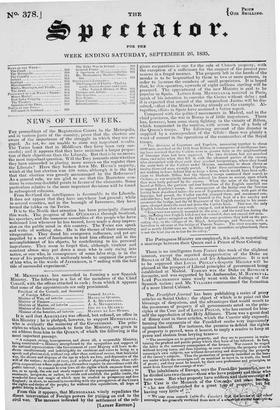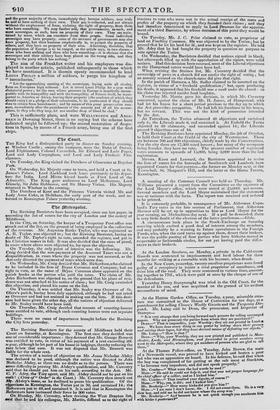The Frankfort Journal has been publishing a series of prosy
articles on Social Order; the object of which is to point out the blessings of despotism, and the advantages that would result to the possessors of property if all governments acted on the prin- ciples of the Czar and of Louis PHILIP, who has earned for him- self the approbation of the Holy Alliance. There was a great deal of flimsy cant in these articles, which the Courier ably exposed; turning the arguments of the Frankfort scribe very ingeniously against himself. For instance, the promise to defend the rights of property is proved, were it honest, to imply a resolve to keep at peace and abstain from levying taxes- " The sovereigns are to protect property, and they are to persevere in main- taining the prudent and pacific policy which they have of late followed. In fact, the latter is the necessary consequence of the former. War cannot be waged without levying taxes, and thus injuring, or even violating, the property of each sovereign's own subjects, nor without devastating and destroying the property of the enemy's subjects. Thus the protection of property inscribed on the ban- ner under which the sovereigns call on mankind to serve is, in truth, the bond of peace ; and they must be bound, by their own professions and principles, to avert from Europe the scourge of war. The inhabitants of Europe, says the FrankfZstiouitadisteare to be divided into two classes—those who have pre-petSy aud thoe who- have none. But what property have soldiersiind theirsoveretkre The Czar is the Monarch of the CosAafts-iind ier herd* "u ho are distinguished for a great je.,44-.4notivtil....:b.4Qof having very little of "W8 May even remark (stdds teurie:-)
--; I
sovereigns are generally recruited from men uf a "tAltiArmies? 'agtothef
logankallit
and the great majority of them, immediately they become soldiers, may truly be said to have nothing of their own. Their pay is collected, and not always without the employment of force, violating the right of property, from those who have something. We may futther add, that governments, as such, and soost sovereigns, as such, have no property of their own. They are main- tained by taxes, which ma exactions from their people. Some individual sovereigns may have property, some of the servants of governments may also have property, but their business emphatically is, to protect the property of others, and they have no property of their own. Admitting, therefore, that the population of Europe is to be ranged, as the article says, in two classes— those who have nothing and those who have something—it is obvious that the sovereigns and their soldiery have been placed on the wrong side, and they belong to the party which has nothing."
The aim of the Frankfort writer and his employers= was- dis- played in another article, published subsequently to those which we have mentioned. It is therein openly recommended to lend LOUIS PHILIP a million of soldiers, to purge his kingdom of "incendiaries."
"Let the approaching meeting of the sovereigns, laying aside all rivalry, form an European high tribunal. Let it invest Louis Philip for a year with dictatorial power ; let the men whose presence in Europe is manifestly incom- patible with its tranquillity and with the tranquillity of France itself, he trans- ported to America or Africa, leaving their property (the usufruct of which they should enjoy) as a pledge of their submission, to be confiscated if they should dare to return from banishment ; and by means of this great preservative mea- sure, immediately after the punishment of the assassin and of all his accom- plices, be they who they may, let not another drop of blood be shed."
This is sufficiently plain, and were WELLINGTON' and ABER- DEEN in Downing Street, there is no saying but the scheme here indicated might be followed up; the second restoration of despo- tism in Spain, by means of a French army, being one of the first steps.



























